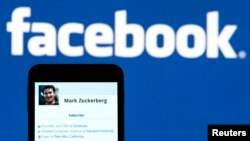U.S. President Donald Trump continued to renounce investigations into Russia's meddling in last year's U.S. presidential election as a "hoax" and renewed his attacks on the media for what he believes was favorable coverage of Democratic presidential opponent, Hillary Clinton.
Trump's remarks come one day after Facebook said it will share with congressional investigators the 3,000 advertisements on the social media site that were found to be linked to Russian interference in the 2016 presidential election.
"The Russia hoax continues, now it's ads on Facebook. What about the totally biased and dishonest Media coverage in favor of Crooked Hillary?" Trump wrote in a Twitter post on Friday.
"The greatest influence over our election was the Fake News Media "screaming" for Crooked Hillary Clinton. Next, she was a bad candidate!," Trump added.
Facebook CEO Mark Zuckerberg made the announcement in a live broadcast Thursday and reiterated Facebook's cooperation with investigations by the U.S. Justice Department and congressional committees.
“When we recently uncovered this activity, we provided that information to the special counsel. We also briefed Congress,” Zuckerberg said. “And this morning I directed our team to provide ads we found to Congress as well.”
This announcement came as Zuckerberg faced criticism of not doing enough to prevent "malicious actors" from using Facebook to manipulate or influence elections.
On Wednesday, 17 Democratic senators and congressmen signed a letter urging the Federal Election Commission to require Facebook to share the information with Congress, noting that Facebook “equips hostile foreign actors with a powerful new tool for disruption of our democratic process."
Zuckerberg said that using Facebook to influence elections is new terrain for social media sites.
“It is a new challenge for internet communities to have to deal with nation states attempting to subvert elections. But if that’s what we must do, then we are committed to rising to the occasion,” he said.
Facebook, the world’s largest social network, said it’s not possible for them to prevent every attempt at using the site to influence elections.
“But we can make it harder, we can make it much harder. And that’s what we’re going to focus on doing,” Zuckerberg said.
Facebook’s investigation revealed a Russian-based operation spent $100,000 on ads attempting to influence the 2016 presidential election. Russia has denied any involvement.





